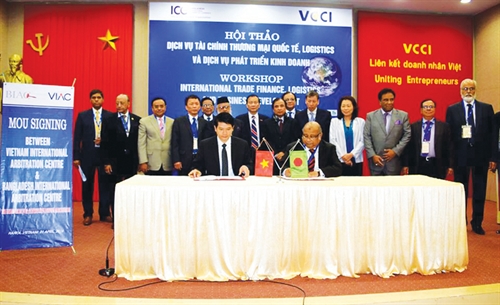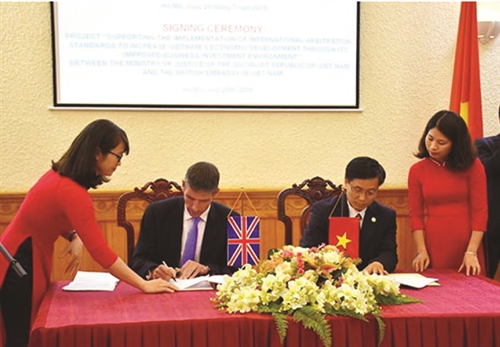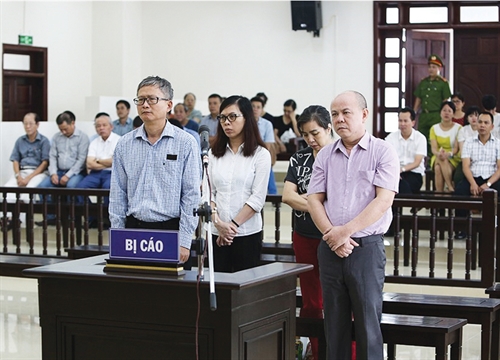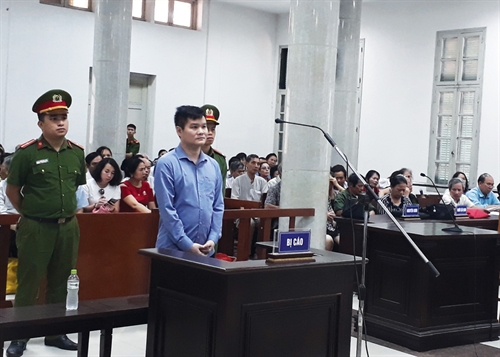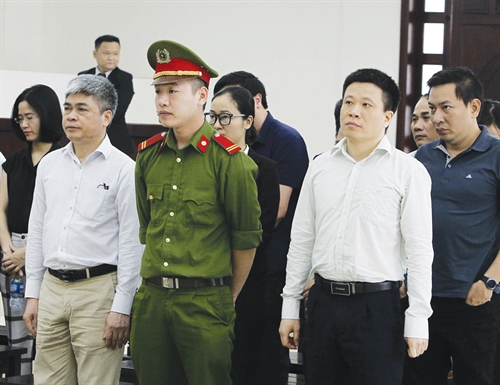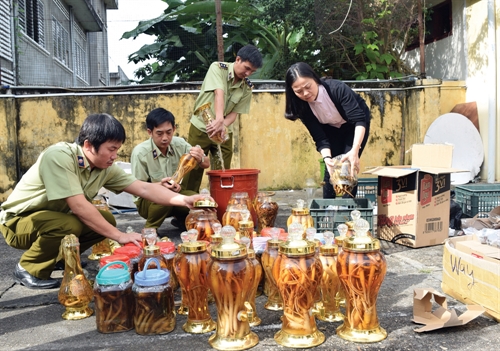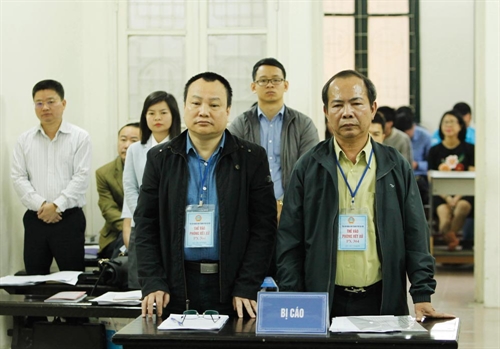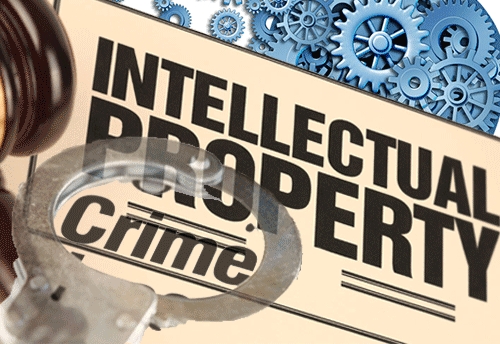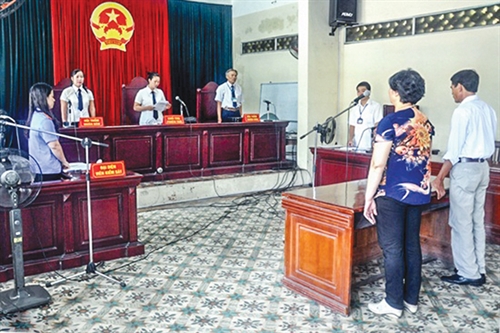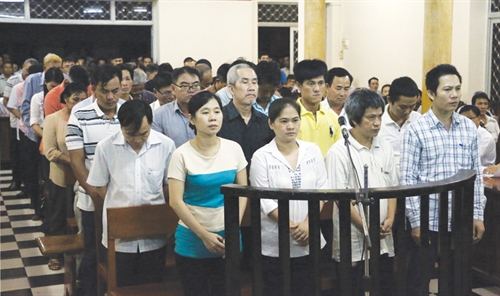Doan Thi Ngoc Hai, LL.M., Nguyen Van Dien, LL.M.
In criminal procedure, evidence plays a particularly important role in all criminal proceedings, from investigation, prosecution to trial, serving as a tool to prove or identify facts and circumstances significant to the settlement of criminal cases. This article analyzes provisions on evidence and sources of evidence in Vietnam’s criminal procedure law.
Evidence
Article 86 of the 2015 Criminal Procedure Code (the 2015 Code) defines evidence “as facts collected according to the order and procedures prescribed in this Code, and used as grounds to determine whether or not criminal acts have been committed, to identify persons committing such acts, and other circumstances and facts significant to the settlement of criminal cases.”
This definition is similar to that provided in the 2003 Criminal Procedure Code (the 2003 Code).
However, while the 2003 Code stipulates in Article 64 that evidence users are investigation bodies, procuracies and courts (proceeding-conducting bodies), the 2015 Code’s definition of evidence mentions no evidence users, implying that not only proceeding-conducting bodies but also proceeding participants, particularly the accused, defense counsels and victims, can use evidence in the course of proving/disproving criminal acts.
To make clearer the above “open” approach, the 2015 Code ’s provisions on the rights of the denounced, persons against whom criminal cases are requested to be initiated, persons held in emergency cases and arrestees, persons held in custody, the accused, defendants, civil plaintiffs and respondents, and defense counsels stipulate that these persons may present their opinions on relevant evidence, documents and objects and request competent proceeding-conducting persons to inspect and assess them. The Code also grants defense counsels and persons defending lawful rights and interests of the denounced, persons against whom criminal cases are requested to be initiated, victims and other involved parties an additional right to inspect and assess evidence.
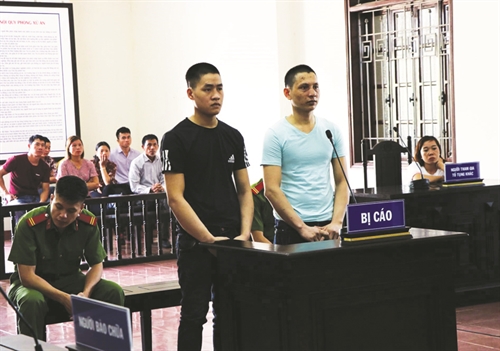 |
| Ngan Van Nguyen (left) and Pham Ba Nhi - two defendants accused of illegally trading and stockpiling narcotics at the first-instance court hearing opened in Hoa Binh province on September 20 __Photo: Thanh Hai/VNA |
Sources of evidence
Under Article 87 of the 2015 Code, evidence may be collected or identified from the following sources:
• Exhibits;
• Testimonies and statements;
• Electronic data;
• Expert assessment and property valuation conclusions;
• Written records of criminal case initiation, investigation, prosecution, trial and judgment execution activities;
• Results of the performance of judicial mandate and other international cooperation activities;
• Other documents and objects.
Article 87.2 stresses that factual things that are collected not according to the order and procedures prescribed in the 2015 Code are of no legal value and cannot be used as grounds for the settlement of criminal cases. It also states that proceeding-conducting persons must objectively and comprehensively check and assess all collected pieces of evidence about criminal cases.
As compared to the 2003 Code, the 2015 Code specifies more clearly several sources of evidence (statements and written records of criminal case initiation and judgment execution activities) and adds some new ones (electronic data, property valuation conclusions, and results of performance of judicial mandate and international cooperation).
Exhibits
According to Article 89 of the 2015 Code, exhibits are objects used as tools or means for commission of offenses, objects bearing traces of crime, objects being subject matters of crime, money or other objects that have the value of proving crime and criminals or are significant to the settlement of criminal cases.
Testimonies and statements
Testimonies and statements are obtained by investigation bodies through their professional activities from arrestees, persons held in custody, the accused, defendants, witnesses, victims, civil plaintiffs and respondents, persons with rights and obligations related to criminal cases, persons denouncing or reporting crimes and observers.
Electronic data
The 2015 Code not only adds electronic data as a source of evidences (Article 87.1.c) but also clearly defines them as symbols, characters, numbers, images, sounds or similar forms created, stored, transmitted or received by electronic devices (Article 99.1).
Expert assessment and property valuation conclusions
These conclusions are made by persons with professional expertise, scientific and technical knowledge who are held responsible before law for their conclusions.
Due to the significance of expert assessment conclusions to the settlement of criminal cases, the 2015 Code provides that in case the expert assessment is performed by a group of persons who make diverse conclusions, each of them may present his opinions to the final conclusions. Article 100.1 of the Code also requires expert assessment conclusions to be expressed in writing.
In addition to expert assessment conclusions, property valuation conclusions are also considered a source of evidence and specified in Article 101 of the Code. Accordingly, property valuation conclusions are documents made by a property valuation council to provide conclusions on prices of property in need of valuation. A property valuation council must bear responsibility for its conclusions.
Property valuation conclusions must bear signatures of all members of a property valuation council. In case of disagreeing with property prices decided by the council, council members must write their own conclusions in written conclusions.
In case a body competent to conduct the proceedings disagrees with property valuation conclusions, it must clearly state the reason for its disagreement; if conclusions are unclear, it must decide on revaluation according to the general procedures prescribed in the 2015 Code.
Valuation conclusions made by a property valuation council that violate the provisions of the 2015 Code and other relevant regulations on property valuation have no legal validity and may not be used as grounds for the settlement of criminal cases.
To date, the Vietnamese State has issued no law on property valuation. However, on March 2, 2005, the Government enacted Decree 26 on property valuation councils in criminal proceedings and this decree has been so far applied by competent proceeding-conducting bodies to valuating property and making property valuation conclusions for use as evidence for the settlement of criminal cases.
Written records of criminal case initiation, investigation, prosecution, trial and judgment execution
Written records of criminal case initiation, investigation, prosecution, trial and judgment execution contain all information about and circumstances related to criminal cases. They constitute not only a valuable source of evidence but also serve as a basis for checking whether procedural steps in criminal proceedings are carried out lawfully or not, thereby ensuring the lawfulness and objectiveness of evidences. They include written records of arrest, crime scene investigation, autopsy, confrontation, recognition, investigation experiments, court hearing scripts, and other minutes of other procedural activities.
Results of performance of judicial mandate and other international cooperation activities
Under Article 6 of the 2007 Law on Mutual Legal Assistance, judicial mandate means a written request of a competent body of Vietnam or a foreign country for the performance of one or a number of mutual legal assistance activities in accordance with the law of the concerned country or the treaty to which Vietnam is a contracting party. This Law also clearly provides the competence and procedures for performance of mutual legal assistance in civil and criminal matters, extradition and transfer of persons who are serving imprisonment sentences between Vietnam and foreign countries; and responsibilities of Vietnamese state agencies in mutual legal assistance.
In reality, many cases involving transnational crimes or organized crimes have been successfully settled thanks to results of judicial mandate. That’s why Article 103 of the 2015 Code clearly stipulates: “Results of performance of judicial mandate and other international cooperation activities provided by competent foreign bodies may be regarded as evidence if they are consistent with other evidence of criminal cases.”
Other documents and objects
Documents and objects other than those mentioned above which are related to criminal cases and provided by bodies, organizations and individuals other than proceeding-conducting bodies and persons may be regarded as a source of evidence. However, in practice most documents and objects provided by those other than proceeding-conducting bodies and persons appear to be unlawful and refused to be used as evidence by such bodies and persons. Only when they show signs of having been used as tools or means for crime commission, bearing crime traces, or being subject matters of crimes, can such documents and objects be used as exhibits.-
------------------------------------------------------------------------------------------------------------------------------------------------------------
COURT NEWS
Code of Judicial Ethics announced
In an effort to concretize essential ethical standards required of judges in compliance with the regulations of the Constitution and laws, the Supreme People’s Court on September 21 issued a Code of Professional Ethics and Conduct of Judges.
With three chapters and 17 articles, the Code stipulates in detail the professional ethics of judges, including independence at work, integrity, impartiality, fairness, probity, expeditious duty performance, dedication and diligence.
While exercising their duties, judges must settle cases and matters assigned to them in a lawful, democratic, strict and objective manner; listen to and respect opinions of proceeding-conducting persons and proceeding participants and explain and guide, and facilitate them in exercising, their lawful rights and obligations; meet with agencies, organizations and individuals involved in the cases that they have the competence to settle at law-prescribed places; and may decline to conduct proceedings in accordance with law.
Judges are also required to detect and propose competent agencies to revise or annul legal documents containing provisions contrary to the Constitution, laws and resolutions of the National Assembly and its Standing Committee in order to ensure legitimate rights and interests of agencies, organizations and individuals.
According to the Code, judges may not provide counseling to the accused, defendants, involved parties or other proceeding participants; illegally intervene in the settlement of cases or matters or make comments or express personal views at court, in public or to the media which can influence the impartial settlement of cases.
They are also prohibited from bringing case files or case file documents out of courts, unless so assigned or permitted by competent persons.
They must refrain from disclosing state secrets and working secrets that they know from their work, other court personnel and related agencies, and professional, business, personal and family-related secrets of the accused, defendants, involved parties or other proceeding participants, unless otherwise provided for by law.-
